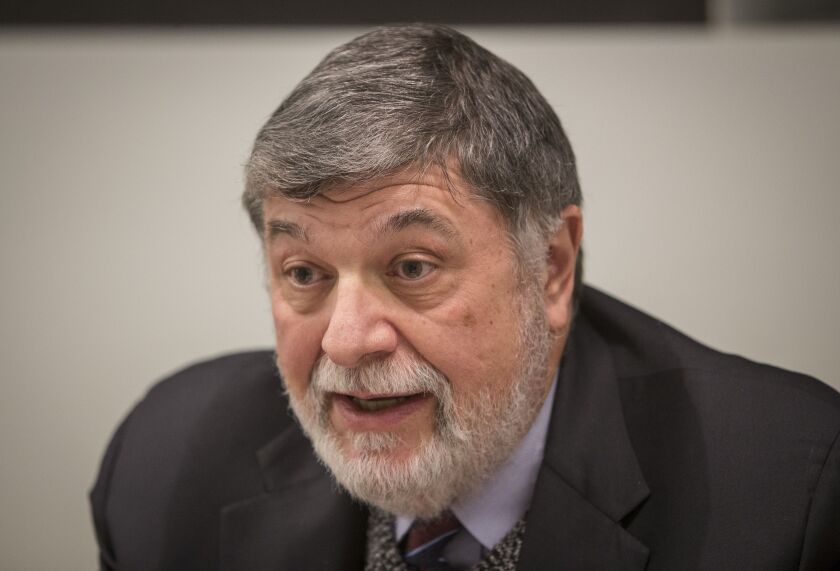It’s going to be a summer of reckoning for your friendly local politician.
COVID-19 and its cessation of commerce are starving government of revenue. Budget departments labor to keep up with the ongoing damage. All the stores we’re not visiting, the gas we’re not buying, the income we aren’t making are compounding losses for the tax collector.
But in every local jurisdiction, there’s a huge issue ahead. Will you, can you, pay your next property tax bill?
Cook County Commissioner Larry Suffredin has been thinking about that a lot, having heard from hard-pressed constituents. Keep in mind that his 13th District is wealthier than most, running along the lakefront from Rogers Park north to Glencoe.
“There is a lot of panic out there,” he said. “This is an evolving issue, and we’re going to have to deal with this pretty quickly.”
Suffredin estimated, based on his conversations with property-owning residents and businesses, the default rate on the tax bills due to be sent this summer will be 30%. He said Cook County typically allows for a 3% default rate when it computes the tax rates needed to raise necessary revenue for local governments.
A high default takes a bite out of the cash flow for schools, city halls and others already straining to pay for basic services. There are ways to make that up with short-term borrowing, but that only adds to debt levels and costs — even at today’s record-low interest rates.
What can the county do? If it keeps to schedule, the next property tax due date is Aug. 1, so the bills have to go out in early July. That’s two months off, but the time will pass quickly, even under quarantine.
The county could push back the payment deadline but — and there are differences of opinion here — that could require approval from the General Assembly. A simpler way to accomplish the same thing would be to delay late fees and penalties, something some collar counties already are doing. Doing that doesn’t hurt the local taxing bodies much since the charges for late payment go straight to the counties. In Cook County, the late fee is a sizable 1.5% interest charge per month.
There’s a bit of history in this matter that shows just what a fix we’re in. Cook County hasn’t tinkered much with property-tax payment schedules since the 1930s when politicians let constituents skip a year’s worth of bills as they suffered through the Depression. So we still technically pay our property taxes a year after they are due. With unemployment rates now headed toward 20%, we are careening into depression-level hardship again.
Any payment deferral creates its own headaches. Governments may have to borrow to make up for a shortfall. As a rule, property taxes are paid twice a year, so pushing one deadline back bumps one payment closer to another.
Two people important to this process are Cook County Board President Toni Preckwinkle and county Treasurer Maria Pappas, whose office sends out the bills and collects the money. They gave me a joint statement last week that said, “Many property owners will not be able to pay their Second Installment property taxes in early August. Our offices are working closely to try to develop a plan to help those taxpayers.” Through spokespeople, they declined to comment further.
Many homeowners and businesses that own property pay their taxes through escrow accounts at their mortgage lender. However, some real estate experts foresee an increase in foreclosures starting a few months from now.
The summer tax bills will land just as businesses are trying to shake off the effects of weeks with little or no income, even if there’s progress in controlling COVID-19.
Noting that many businesses are “in need of property tax relief,” Jack Lavin, CEO of the Chicagoland Chamber of Commerce, said in an email, “The business community is working with Cook County to find a solution that doesn’t penalize those who cannot afford to pay property taxes in August, so as not to create greater economic hardship for those who have already been significantly impacted as a result of the ongoing pandemic.”
What happens when state and local governments extend tax breaks they can’t afford?
Scott Smith, spokesman for Cook County Assessor Fritz Kaegi, said, “Our office believes the best way for property owners to find relief from an overreliance on property taxes is for the federal government to increase the emergency funding available to cities, counties and states.”
Enter the Federal Reserve, which has pledged up to $500 billion to help public agencies with cash flows. The Fed is called the “lender of last resort.” It’s living up to the name.






